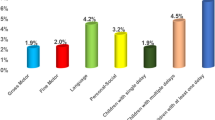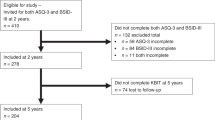Abstract
Objective: To examine the accuracy and clinical utility of maternal estimates of mental age in young children referred for developmental assessment.Methods : Mothers of 100 children aged 16 to 60 months referred for developmental evaluation to psychology services of Department of Pediatrics of a tertiary care teaching hospital were asked to estimate the mental age of their child. Maternal estimates were converted to intelligence quotient (IQ) and were compared to results from developmental tests of cognitive and adaptive behavior functioning which were administered to all children.Results : Maternal estimate IQ was highly correlated with IQ calculated from Developmental Profile II (r=.83, p<.001) and social quotient (SQ) calculated from Vineland Social Maturity Scale (r=.81, p<.001). Maternal estimate IQ was 82% sensitive to cognitive delay and 81% specific in identifying children likely to have normal development. Twenty seven percent of the maternal estimates were within ±5 IQ points of actual IQ. Mothers were more likely to overestimate their child’s functioning. Maternal IQ (Mean=62.1, S.D. =25.8) was significantly higher (t=2.93, p<.004) than the actual IQ (Mean=57.9, S.D.=21.9). Step-wise multiple regression analysis revealed that the child’s IQ and SQ explained 10% of the variance (F=6.40, p<.001) in maternal accuracy. The lower the SQ and IQ of the child, more accurate the estimates.Conclusion : Maternal estimates of mental age provide an accurate measure of developmental functioning in young children and may be used as a screening technique to identify a subset of children who need more detailed evaluation.
Similar content being viewed by others
References
Committee on Children with Disabilities. Screening young children for developmental disabilities.Pediatrics 1994; 93: 863–865.
Malhi P, Singhi P. Screening young children for delayed development.Indian Pediatr 1999; 36: 569–577.
Glascoe FP. Evidence-based approach to developmental and behavioral surveillance using parents’ concerns.Child Care Health Dev 2000; 26: 137–149.
McCarton CM, Brooks-Gunn J, Wallace IF. Results at age 8 years of early intervention for low-birth-weight premature infants. The Infant Health and Development Program.JAMA 1997; 277: 126–132.
Guralnick MI. Effectiveness of early intervention for vulnerable children: a developmental perspective.Am J Ment Retard 1998; 102 : 319–345.
Majnemer A. Benefits for early intervention for vulnerable children with developmental disabilities.Semin Pediatr Neurol 1998; 5: 62–69.
Squires J, Nickel RE, Eisert D. Early detection of develop-mental problems: strategies for monitoring young children in the practice setting.J Dev Behav Pediatr 1996; 19; 420–427.
Dobos AE, Dworkin PH, Bernstein B. Pediatricians’ approach to developmental problems: 15 years later.Am J Dis Child 1992; 146: 484–490.
Glascoe FP, Dworkin PH. The role of parents in the detection of developmental and behavioral problems.Pediatrics 1995; 95: 829–839.
Blackman JA, Healy A, Ruppert ES. Participation by pediatricians in early identification: impetus from public law 99–457.Pediatrics 1992; 89: 98–102.
Sices L, Feudtner C, McLaughlin J, Drotar D, Williams M. How do primary care physicians identify young children with developmental delays? A national survey.J Dev Behav Pediatr 2003; 24: 409–417.
Bierman JM, Conner A, Vaage M, Honzik MP. Pediatricians assessment of the intelligence of two-year-olds and their mental test scores.Pediatrics 1964; 43: 680–690.
Dearlove J, Kearney D. How good is general practice developmental screening?Br Med J 1990; 300: 1177–1180.
Bowie D, Parry JA. Court come true-for better or for worse.Br Med J 1984; 299: 1322–1324.
Tew B, Laurence KM, Samuel P. Parental estimates of the intelligence of their physically handicapped child.Dev Med Child Neurol 1974; 16: 494–500.
Pulsifer MB, Hoon AH, Palmer FB, Gopalan R, Capute AJ. Maternal estimates of developmental age in preschool children.J Pediatr 1994; 125: S18-S24.
Glascoe FP, Sandler H. Value of parents’ estimates of children’s developmental ages.J Pediatr 1995; 127: 831–835.
Alpern G, Boll T, Shearer M.Developmental Profile II (DP II) Los Angeles, Western Psychological Services, 1986.
Malin AJ.Indian adaptation of the Vineland Social Maturity Scale. Lucknow; Indian Psychological Corporation, 1971.
Keshavan MS, Narayanan HS. Parental estimation of developmental level.Am J Dis Child 1983; 137: 87–88.
Blacher-Dixon J, Simmeonsoon RJ. Consistency and correspondence of mothers’ and teachers’ assessments of young handicapped children.J Div Early Childhood 1981; 3: 64–71.
Coplan J. Parental estimate of child’s developmental level in a high risk population level in a high risk population.Am J Dis Child 1982; 136: 101–104.
Newborg J, Stock JR, Wnek L.Battelle Developmental Screening Inventory Screening Test. Chicago; Riverside Publishing, 1988.
Meiseis SJ. Can developmental screening tests identify children who are developmentally at risk?Pediatrics 1989; 83: 578–585.
Author information
Authors and Affiliations
Corresponding author
Rights and permissions
About this article
Cite this article
Malhi, P., Kashyap, S. & Dua, S. Maternal estimates of mental age in developmental assessment. Indian J Pediatr 72, 931–934 (2005). https://doi.org/10.1007/BF02731666
Issue Date:
DOI: https://doi.org/10.1007/BF02731666




